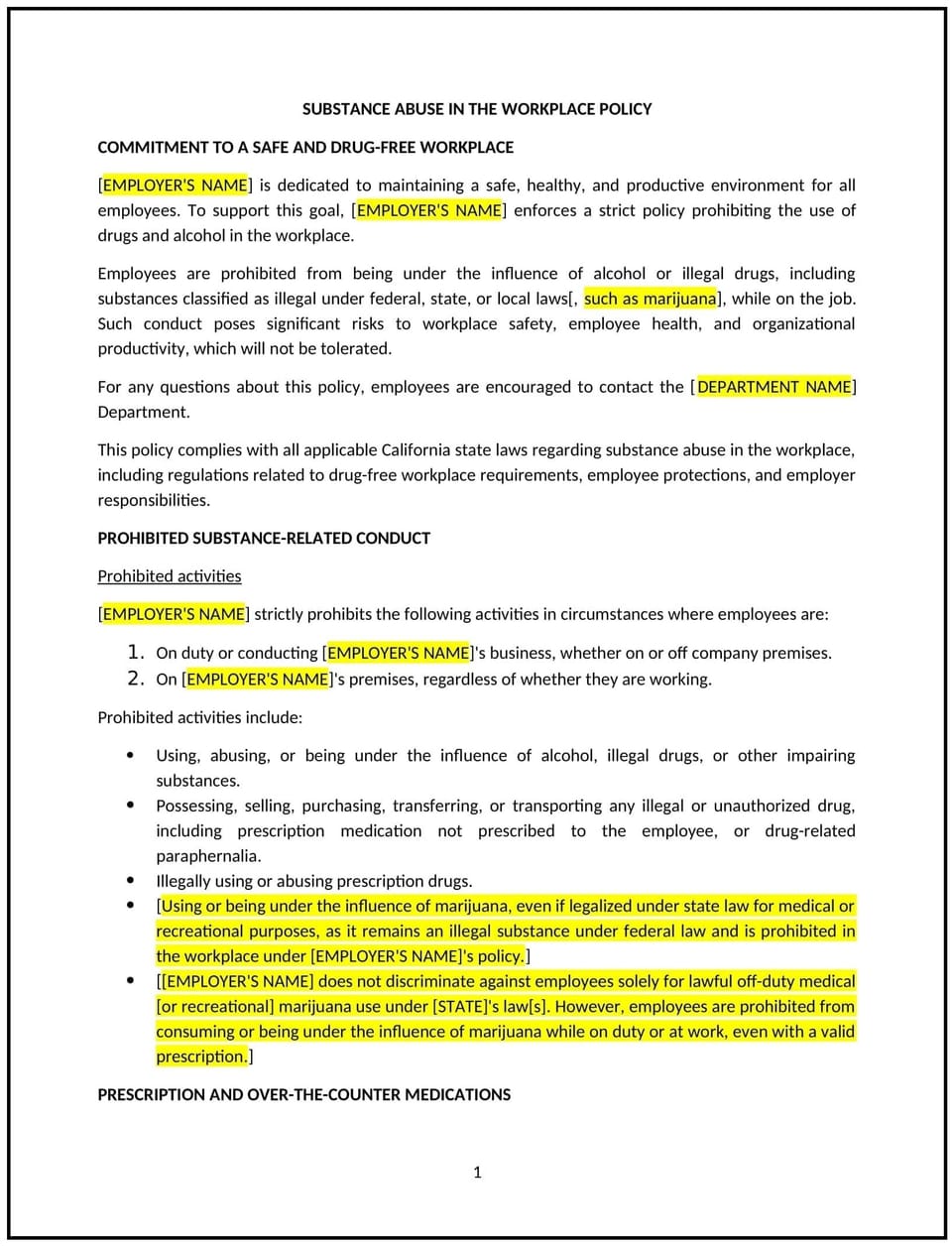Substance abuse in the workplace policy (California): Free template

Substance abuse in the workplace policy (California)
In California, a substance abuse in the workplace policy provides businesses with guidelines for maintaining a safe and productive work environment while supporting compliance with state and federal laws, such as the Drug-Free Workplace Act and California’s protections under the Fair Employment and Housing Act (FEHA). This policy addresses the use of alcohol, illegal drugs, and misuse of prescription medications in the workplace.
The policy outlines expectations for employee behavior, procedures for addressing substance abuse issues, and resources for employees seeking help. By implementing this policy, California businesses can promote safety, reduce risks, and support employee well-being.
How to use this substance abuse in the workplace policy (California)
- Define prohibited behavior: Clearly outline restrictions on the use, possession, or distribution of drugs and alcohol during work hours or on business property.
- Address medical accommodations: Include provisions for managing employees who may be using prescribed medications under California’s disability accommodation laws.
- Outline testing procedures: If applicable, detail the business’s drug and alcohol testing policy, ensuring compliance with California laws.
- Provide resources: Offer information about employee assistance programs (EAPs) or community resources for substance abuse support.
- Communicate disciplinary actions: Specify consequences for policy violations, such as verbal warnings, suspension, or termination, while adhering to California employment laws.
Benefits of using this substance abuse in the workplace policy (California)
This policy offers several advantages for California businesses:
- Supports compliance: Reflects California labor laws and federal requirements for maintaining a safe and drug-free workplace.
- Enhances safety: Reduces risks of accidents and injuries caused by substance abuse in the workplace.
- Promotes fairness: Provides consistent guidelines for addressing substance-related issues among employees.
- Encourages support: Offers resources and accommodations for employees seeking help with substance abuse challenges.
- Protects reputation: Demonstrates the business’s commitment to a safe and professional work environment.
Tips for using this substance abuse in the workplace policy (California)
- Reflect California-specific laws: Ensure compliance with FEHA, which requires reasonable accommodations for employees with substance use disorders as a disability.
- Train managers: Provide guidance on recognizing and addressing substance abuse issues while respecting employee privacy.
- Use clear communication: Share the policy with employees during onboarding and periodically reinforce expectations.
- Encourage voluntary disclosure: Foster a culture where employees feel comfortable seeking help without fear of retaliation.
- Review regularly: Update the policy to reflect changes in California laws or workplace safety requirements.
Q: How does this policy benefit the business?
A: This policy supports compliance with California laws, promotes workplace safety, and provides a clear framework for managing substance abuse issues.
Q: What substances are prohibited under this policy?
A: The policy prohibits the use, possession, or distribution of alcohol, illegal drugs, and the misuse of prescription medications during work hours or on business premises.
Q: How does this policy support compliance with California laws?
A: The policy aligns with California labor laws and federal requirements, including protections for employees with substance use disorders under FEHA.
Q: What steps should employees take if they need help with substance abuse?
A: Employees are encouraged to reach out to HR or an EAP for confidential support and resources.
Q: How can the business address violations of this policy?
A: The business can follow the outlined disciplinary process, which may include warnings, suspension, or termination, while ensuring fairness and legal compliance.
This article contains general legal information and does not contain legal advice. Cobrief is not a law firm or a substitute for an attorney or law firm. The law is complex and changes often. For legal advice, please ask a lawyer.


